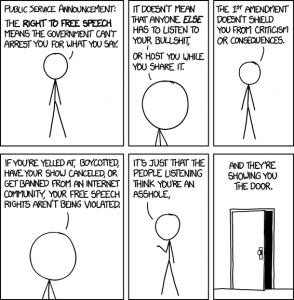On (Dis)Engagement: Let’s not act like we all need to think alike on everything (and ideas on how to proceed when we do) :: A two-part essay :: 1 2
So now, how can we engage about volatile topics? I think it’s vital that we engage when we can, as opposed to living in fear, destroying each other, and burning or exiling heretics.1 From that principle, I will essay.
If we believe that it’s unethical to coerce people’s consciences into pointing any which way we demand, I think we must try harder to distinguish between “I don’t like them doing that” and “They shouldn’t be allowed to do that.” I have no issues with homosexuality, and sometimes I even have “those” fantasies. But even if I did have issues with homosexuality, does it follow that I have to work to prohibit it? Is it any of my fucking business? Seriously, who died and made me king? On matters where we are not in each other’s faces, where cooperation is not needed (we probably have to have nigh-universal rules for driving and for what a legally-protected relationship is, to name two examples), why should other people just up and conform to what I want? This kind of narcissism mixed with political (or social) authority is a match made in hell.
And yet, for the sake of the sovereignty of our minds, I contend that it’s disturbing that some of the people who defend the legitimacy of homosexuality and the broadening of access to the legal status of marriage don’t seem to make a distinction between “I don’t like them talking about that” and “They shouldn’t be allowed to talk about that”. The casualties have so far included reality TV stars and tech CEOs – actually, as far as I know, his ‘speech’ was only in making a political donation six years ago, and he didn’t double down on it. Perhaps, for these people, it will be hard for us to shed a tear. After all, they’re already powerful people, so they won’t become destitute. But what about people who aren’t reality TV stars and tech CEOs, people who truly have their livelihoods at stake?
It bears repeating: People who hold views exactly opposed to, for example, Phil Robertson’s, should not be so quick to fan the flames of heresy and dissociation.2 Yes, I happen to believe that there is nothing intrinsically3 immoral about homosexuality, not to mention that it’s relatively common in nature, with few apparent ill effects (else it would probably have been selected against in nature). And while the acceptance of homosexuality existing is necessary for homosexually-inclined people to be able to live in freedom from fear, nothing, including homosexuality, is morally sound or morally abhorrent just because of the numbers of people who say so.4
And so, today, yes, it’s not your view that is, in the words of Randall Munroe, having people “showing you the door”. But what about tomorrow?
I dislike this comic because while it is accurate on its face – our laws cover only governmental suppression of free speech5 – it doesn’t cover that there are controversial stances that aren’t merely “your bullshit”. While we can infer that nothing in this comic contradicts that, and perhaps we can infer that people can voice a contrary view without necessarily being an asshole about it, I think this issue, because of its essentialness, calls for explicitness. Some people will think you’re an asshole-equivalent for merely bringing up certain issues. “Or host you while you share it” could be a celebration of the fact that even your webhost could potentially find a way to disown you6, which bears special consideration because it is a bit like a publisher withdrawing their imprimatur… and then all of your books vanishing, including the ones already on your reader’s shelves.7
If you’re excommunicated, perhaps “it’s just that the people listening think you’re an asshole, and they’re showing you the door.” Must I even say that allowing we-think-you’re-an-asshole to make right is rather chilling? People can get shouted down and lose their jobs and worse for saying things that aren’t politically correct, whether or not they’re true. We used to explicitly call this deviation “heresy”. It may be time to bring the word back, because I think that’s the form our thinking is taking, whether we’re aware of it or not.
While we can automatically show people who we think are assholes the door and this isn’t protected by the US First Amendment or, as far as I know, the equivalents in other countries, it definitely doesn’t follow that we should. Mark Steyn writes about this in his essay, “The slow death of free speech”:
“What [these recent] stories have in common, whether nominally about Israel, gay marriage, climate change, Islam, or even freedom of the press, is that one side has cheerfully swapped that apocryphal Voltaire quote about disagreeing with what you say but defending to the death your right to say it for the pithier Ring Lardner line: ‘“Shut up,” he explained.’
“A generation ago, progressive opinion at least felt obliged to pay lip service to the Voltaire shtick. These days, nobody’s asking you to defend yourself to the death: a mildly supportive retweet would do. But even that’s further than most of those in the academy, the arts, the media are prepared to go. As Erin Ching, a student at 60-grand-a-year Swarthmore College in Pennsylvania, put it in her college newspaper the other day: ‘What really bothered me is the whole idea that at a liberal arts college we need to be hearing a diversity of opinion.’ Yeah, who needs that? There speaks the voice of a generation: celebrate diversity by enforcing conformity.
“The examples above are ever-shrinking Dantean circles of Tolerance: At Galway [at the National University of Ireland], the dissenting opinion was silenced by grunting thugs screaming four-letter words. At Mozilla, the chairwoman is far more housetrained: she issued a nice press release all about (per Miss Alcorn) striking a balance between freedom of speech and ‘equality’, and how the best way to ‘support’ a ‘culture’ of ‘diversity’ and ‘inclusiveness’ is by firing anyone who dissents from the mandatory groupthink. At the [UK] House of Commons they’re moving to the next stage: in an ‘inclusive culture’ ever more comfortable with narrower bounds of public discourse, it seems entirely natural that the next step should be for dissenting voices to require state permission to speak.”

Voltaire. It was his biographer Evelyn Beatrice Hall who wrote “I disapprove of what you say, but I will defend to the death your right to say it” in order to illustrate his beliefs. (Wikipedia)
Andrew Coyne writes about the distinction between state and societal sanctions being “a difference more of degree than of kind”:
“For example, the ability in this wired age to mobilize large numbers of people, suddenly and often without much information or context, into tarring someone as a racist, a sexist or worse — and to pressure others to shun them for fear of facing the same poisonous charge — conveys a kind of power. Like all powers it carries an obligation not to abuse it, and like all powers it is abused.
“And while most forms of state restraints on speech, short of outright censorship or prior restraint, involve some expectation of due process, no such rules apply in the vigilante justice meted out online. It is one thing to say that speech comes with consequences, but I’m not sure anyone signed up for the idea that a single ill-judged tweet or private remark could cost them their job.
“More to the point, the line between state and society is not so easily drawn. The idea that the state should refrain, as a rule, from regulating speech, the willingness of the public to legislate restraints on the state’s ability to do so, the readiness of those in power to be so restrained, all are born of a climate of opinion that recognizes the intrinsic value of speech, even or perhaps especially where it offends.
“So far as we follow the opposite impulses in our private interactions with each other, so far as we attempt not to argue with others but to intimidate them, so far as we indulge the toxic nonsense that there is a right not to be offended, we undermine that consensus, and so in turn weaken our defences — intellectual, political, legal — against the government doing likewise.”
I had been trying not to write an article about free speech – I thought it was an axiom enough of us agreed on that I didn’t see it as something that needed defending. But after watching this The Agenda panel on free speech, I feel chilled. Encouraged, though, inasmuch as at least we’re talking about it – for now, we still have free speech about free speech.
At 7:58, Rachel Décoste speaks in terms of how you can’t just say anything to the “impressionable minds” at Queen’s University. At 14:12, she explains why she successfully pushed to prevent Ann Coulter from speaking at the University of Ottawa. If Ann Coulter were to speak, she believes there should also be a fact-checker. “Letting [these people I disagree with] have free reign is not a good way to educate our young people’s minds.” The lesson seems to be: If you disagree with something someone says, you have the right to define the terms of discourse.
How far could we take this idea? Is it immoral to publish Salman Rushdie without in-book rebuttal from Ruhollah Khomeini? I mean, those books of Rushdie’s could fall into the hands of “impressionable young minds”. Clearly what we need is some kind of age of consent for reading so that young people won’t be exposed to ideas until they fully understand the consequences of the ideas. The best thinkers, of course, wait until they are fully adult before thinking. But since it’s hard to police what young people read, we can at least limit the public speakers they’re exposed to.

Saint Mary’s University. I spent about six years here, on aggregate. You can create a different message if you cover up certain letters on the sign. You can do that at other places, too. (Wikipedia)
You can tell me I’m looking at the past with rose-colored glasses and therefore that this rhetorical question is fatally flawed: Did it not use to be that universities were bastions of intellectual freedom rather than glorified finishing schools? Rex Murphy writes incisively on the matter of Brandeis University revoking the offer of an honorary degree for Ayaan Hirsi Ali:
“So, here is a woman of some earned fame and widely noted achievements. She has been variously lauded by some of the strongest advocates on the planet — I’ll just instance the late Christopher Hitchens as an example. But after extending its invitation, Brandeis received protest from the Council on American-Islamic Relations (CAIR) branding her (in their delightful cant phrase) “a notorious Islamaphobe.” And students at the university, deploying the other cant formulation for unacceptable ideas — “hate speech” — collected 85 names from a 350-person faculty petitioning the offer be rescinded. Their petition carried the now-familiar prissy, hollow whines that some students would be “uncomfortable,” would “not feel welcome,” if Ali, with her learned views on Islam and women — derived mainly from her personal life experience, mind you — were to be honoured.
“Is this what Western thought and philosophy at the university has come to — setting up intellectual quarantines lest the immature and frightened be made uncomfortable or to feel unwelcome? Is this university or daycare? Giving into such adolescent whimpering is despicable; giving in to in on a university campus is unforgivable.
“Why in Aristotle’s name do institutions dedicated to higher learning tolerate these rags of verbal flannel — uncomfortable, unwelcome — from putative adults? Damn it, a university exists to unsettle, to throw down established attitudes, to shine the searchlight of reason on all ideas. Universities are supposed to be bold, confident, courageous institutions, whose biggest duty to their students is to expand the range and depth of their ideas, not confirm their prejudices.”
After having shown you all that, I think there’s reason to be hopeful regarding free speech on the internet, because as quickly as the mobs coalesce to shut prominent people down in meatspace or online, they can’t muzzle everybody. If we keep the internet free, free speech will be virtually guaranteed.
And so, in general, as far as engagement goes, I think there is cause to hope. As much as we complain, reasonably or not, about the YouTube commenting system, commenting systems as a whole have enabled a great deal of topical discourse between disconnected individuals that simply didn’t exist before. Yes, there were forums, but forums are vastly less open in terms of topics, membership, and audience. A discussion about road engineering issues on a highways blog, group, or forum isn’t quite public discourse. And while it might be of interest to road enthusiasts what road enthusiasts have to say about a new Avril Lavigne video, it will probably escape the notice of virtually everyone else.
But practically everybody engages in social media, whether to participate or just to lurk. If we’re so inclined, we can be a little like Socrates:
Facebook and Twitter are our Agora.
I live in a reasonably free country called Canada, and while I might theoretically be in danger from vigilantes armed with an accusation of “corrupting the youth”, I seldom encounter youth anyway, as we dutifully keep most youth in authoritarian enclaves called “schools”, ensuring that a great deal of experience is filtered (not to mention that to some extent the place itself is a filter), and it’s doubtful that my encounters with youth will increase given that becoming a teacher is a hopeless business, not to mention that I don’t really want to do it anyway.8
So I said that to say that I haven’t been lynched or jailed yet, nor have I suffered too much in the way of social sanction.9 (Perhaps because I’m starting from the bottom anyway?) I’ve lost Twitter followers and Facebook friends, but there have been no en masse departures. The worst thing so far has been when one person tried to shame a Facebook online-only acquaintance for not condemning and/or unfriending me.10 But why should I get worked up when these things happen? Why should I care so much about what other people think? Well, inasmuch as those other people hold power over me, individually or collectively, it’s hard not to care.
The time to change people’s attitudes about things is before the lynch mobs form. Before fire alarms are pulled. Before abortion clinics are bombed. I suppose also before topless rally disruptions – if there had been more participants in the disruption, it might have had some of the very chilling effects I decry, and I will decry them even though I support easy and early abortions and also a much more relaxed attitude towards clothing.

FEMEN, protesting Euro 2012. I endorse the principle of such protest assuming that for this picture they didn’t force a pro-stadium speaker off a stage or something.
Inasmuch as things have causes, we all have cause for thinking the way we think and believing what we believe. We should hesitate to adopt the conceit that our thoughts and beliefs are very special in any way, though a few of them might happen to take us above the parapet if we’re (un)lucky. We should especially respect where people’s thoughts and beliefs are coming from. Not that they’re right! But respect in the sense that, although their thoughts may merit feedback and/or resistance, the person behind the thoughts and beliefs isn’t somehow subhuman11 and deserving of all the vitriol we can muster.
“He that complies against his will
Is of his own opinion still.” – Samuel Butler, Hudibras
You can’t win an argument by mere coercion, and as soon as the coercive pressure is released, the other party will revert to their original opinion. In fact, their resentment of you might well cement them in it. Granted, you might not care about this much if you have the wherewithal to rule humanity by your decree. But I’m assuming you want to be free to think for yourself, therefore you should encourage others to allow others to think for themselves, thereby helping assure your right to think for yourself.
Not all of our thoughts and opinions are founded on the same base, and the information therein is certain to be somehow inaccurate and somehow incomplete. And that’s not even including the epistemological issues. I happen to subscribe to the idea that there’s no final proof of anything, that we can theoretically if not practically go on finding proofs-of-proofs forever. Or we can repeat ourselves at some point (a circular argument), but nothing sustains the circle except the circle itself. Another option: just use a tautology. Jean Chrétien knows all about this:
You can go ahead and bully other people into your way of thinking, but by doing so you are dehumanizing the other person because you are taking away their right to disagree with you. You can forcibly inflict your system of thought on another, just because you think it’s right. To hell with the assholes who don’t agree with you! They’re assholes, because they hold those deplorable other views.
But those views aren’t just wrong – they’re offensive! Of course, you’re only as ‘justified’ in being offended as people are in holding any other thought to any degree of sanctity, but don’t fret about that: your window is special. Go ahead and rage – you’re entitled to it.
I’m being flippant here to try to stimulate self-examination. We can be remarkably eager to fly off the handle when we see a hair out of place when it comes to certain things. It’s ‘justified’, but so are honour killings, where the rubber meets the road: in the minds of the killers. Our assurance of our justification doesn’t make something right.12
When we speak, we should, for our own protection and also for the mental health of the people who might explode, be aware of the effects of people being offended by things. If you can say something accurate without getting nuked in the face, that does you and your observers some credit. But when it comes down to a contest between truth and risking offending people, I’m picking truth. We all should, inasmuch as we are interested in learning things and thinking about things.13

Taboo: Nothing to be afraid of! (Wikipedia)
The offended reaction is expensive and it will subside with time. Once it’s over, why don’t we examine things? I’m not suggesting you have to go read Mein Kampf to respond to someone who blames Jews for everything. Just examining your thinking in the moment is plenty. And “I won’t because they’re wrong” is not an acceptable answer, at least for me. How do you know they’re wrong? You might have just assumed it, you might only be acting out what you believe – you may not have considered the Reason behind the beliefs – if any! For example, we hold the belief that slavery is wrong (and I expect we’ll continue to hold it), but we of the present have seldom had cause to consider why slavery is wrong. And in cases where there is Reason behind our beliefs, there may be more information available now than there was when the belief was formed.
For me, belief itself must be believed to be malleable, though I’ll understand if for practical reasons most of us don’t spend too much time wondering whether or not we exist.14 Through this shared flexibility, we can eventually come to a system of shared values that is least obtrusive. Free speech. Speak with respect. Don’t steal shit. Don’t shit on shit. We could have a global meta-culture that shares a small set of fundamental principles.15

Ballcourt, dedicated by Uaxaclajuun Ub’aah K’awiil in 738. Part of the Copán site of the Maya civilization, a UNESCO World Heritage Site. (Wikipedia)
“Since wars begin in the minds of men, it is in the minds of men that the defences of peace must be constructed.” – UNESCO Constitution
UNESCO formally came into being on November 4th 1946, after twenty countries ratified its constitution. The United States was one of the founding members, and the USSR signed on in 1954, the year after Stalin’s death. The Hatfields and McCoys didn’t sign, though both families appeared on Family Feud in 1979.

What the Hatfields and McCoys have come to (Wikipedia)
So there’s hope. So let’s talk. We might not come to agree tomorrow, but we might be able to live with each other today.
Update: This article is relevant: “I Don’t Want to Be Right (Why Do People Persist in Believing Things That Just Aren’t True?)”, Maria Konnikova, The New Yorker. It seems that would-be polemicists like me would do well to bear in mind the attachment people have to beliefs that are linked to their sense of identity. It might be nigh-impossible to address such beliefs without it being a fundamental threat to the belief-holder.
The good or distressing news, depending on whether or not you are in politics, is that you can use identity-linked beliefs to your advantage. Not that anyone’s ever exploited that for questionable ends. We ordinary, hard-working Nova Scotians are too shrewd for that stuff to work.
More: Bill Maher, at the end of the May 23rd Real Time, had some incisive and funny things to say about political correctness and the absurdity of thinking everyone should follow the same social-progress timeline that you do. I’d quote from it but this article is long enough already, and this <ahem> third-party upload isn’t embeddable. But do watch it.
Moar! Jonathan Rauch, The Atlantic – “The Case for Hate Speech” (“America’s transformation on gay rights over the past few years is a triumph of the open society. Not long ago, gays were pariahs. We had no real political power, only the force of our arguments. But in a society where free exchange is the rule, that was enough. We had the coercive power of truth.”)
And just for fun… Scott Adams, Dilbert – January 12, 1992
Refraining from doing so had to be argued for in the past and the arguments are worth revisiting: see this part of the TED talk “The Long Reach of Reason” by Steven Pinker and Rebecca Newberger Goldstein. Watch the full talk if you have time. ↩
And why couldn’t someone like Dan Savage have gone on Duck Dynasty? It could have been great television. ↩
I say ‘intrinsically’ because if you’re in a place where it’s severely repressed, it might be extrinsically immoral if you act carelessly and ’cause’ someone to be jailed or worse. ↩
I’m taking the position that there is an probe-able ‘intrinsic’ and/or ‘real’ morality of things, provided you take on a value-axiom such as “well-being of conscious creatures”. Sam Harris expounds on this position in his book, The Moral Landscape: How Science Can Determine Human Values. ↩
Though not all of it: What about Chelsea Manning? More of the fundamental problems with this comic are described in the post “XKCD doesn’t understand free speech—or the difference between legal and moral rights” by Will Shetterly. ↩
Which seemed to happen to me just a few weeks after this essay was published! Fortunately, it was just about my e-mail settings allowing too much spam to reach my e-mail host. ↩
There’s sometimes the option of the the Wayback Machine at archive.org – a very useful resource, but it often only has the front pages of things and doesn’t always have images. ↩
For some of the many reasons why I don’t, expressed with admirable precision, I refer you to CGP Grey and Brady Haran’s excellent Hello Internet podcast. They discuss school in terms of what it actually does (very important), and Grey talks about his experiences training to be and working as a physics teacher. ↩
That is, as of that writing I hadn’t yet. I went on to lose a whole group of friends and connections at once. ↩
She posted on his timeline something like, “You’ve done a lot for us, but I lost all my respect for you when…” – I’d link it, but I’m scared to look at it and for my own self-preservation I declared that I was checking out of that thread. It may still be somewhere on Halifax journalist Tim Bousquet’s timeline if you want to go looking for it. I’m not even going to look through the comment notifications in my e-mail to find the link; I’ve seldom been so petrified in all my life, so I have no self-interest in reliving the experience. It’d be like watching a dashcam video of my own car crash. Worse than that: this crash always has the potential to create new crashes. I’m scared just saying this much, but that’s oddly enough a good reason to say something. ↩
Be very careful about dismissing someone because you believe they are mentally ill. Homosexuality was regarded as a mental illness until the 1970s. (Homosexuality and Psychology, Wikipedia) ↩
Do comment, though, if you find me saying something equivalent to “cow tau” or “tow the line”. Just don’t attack me for being an unedyoucated hik. ↩
Especially things we’re not supposed to learn and think about – they need our attention the most! When I was five I learned that girls and boys had differing orifices, so I drew a little table about it. I was not particularly encouraged to follow this line of inquiry. ↩
“A physicist is an atom’s way of thinking about atoms.” – Somebody. Found in Bill Bryson‘s excellent, accessible history of science book A Short History of Nearly Everything. ↩
Scott Alexander, Slate Star Codex – “Archipelago and Atomic Communitarianism” ↩

